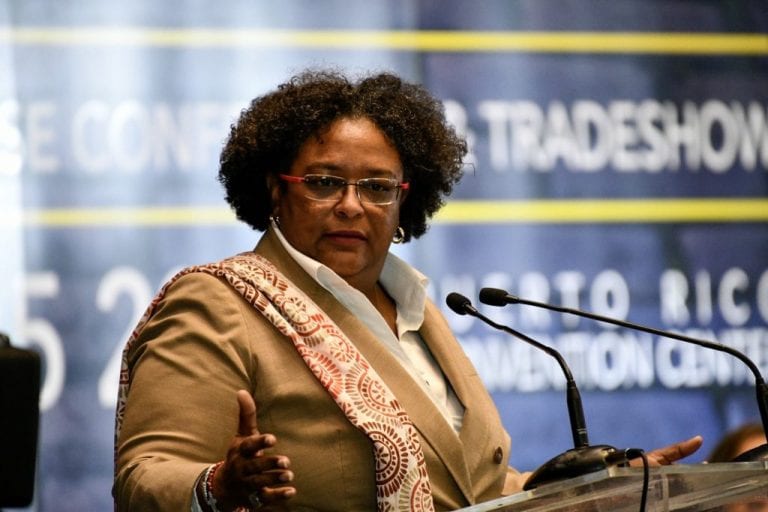28th March 2024
Barbados Prime Minister Mia Mottley has tabled what is largely being hailed as a pro-business budget for 2024/2025.
The budget followed estimates detailing an accrual-based total outlay of US$2.33bn, including US$1.71bn allocated for current expenditure and US$622.4mn earmarked for investments in capital projects and debt repayment.
While budgetary allocations to line ministries and other entities are usually the focus of budget speeches, Mottley spent a lot of time detailing changes to fiscal policy and investment strategy.
“There will be no new taxes… I am telling you up front that I will warn you that there will be some adjustments during the course of this year of a few rates that we will need the public to be able to bear,” began Mottley, as she focused on reviewing tax structures and improving financing access for both private and public sectors.
The Prime Minister announced a sweeping reform of corporate taxes, introducing multiple tiers of tax rates to bolster economic growth and innovation. Small businesses registered under the Small Business Act will benefit from a reduced tax rate of 5.5%, while a general 9% rate will apply to most other resident entities.
Additionally, resident entities that are part of multinational enterprises (MNEs) falling within a defined scope will face a 15% top-up tax. To further stimulate job creation and innovation, the reforms include refundable tax credits for employment and research and development activities. A new 4.5% tax regime has been created to govern intellectual property, designed to incentivise investment in intangible assets.
Mottley also revealed plans to establish “Business Barbados,” a state-owned enterprise designed to offer comprehensive support to local businesses from inception through their entire operational lifecycle. This initiative is poised to streamline business processes, with the Corporate Affairs and Intellectual Property Office (CAIPO) being integrated into the new entity.
Business Barbados will house two separate divisions within its structure: the Corporate Registry, to handle business registrations, and the Intellectual Property Division, to manage IP-related matters, enhancing the ease of doing business in Barbados.
The Prime Minister’s newly proposed tax incentives, effective from 1 April 2024, include a 25% non-refundable tax credit to enhance research in marine studies and the green economy; a 50% refundable credit for projects achieving net zero emissions; 50% refundable credit for local art purchases up to US$0.5mn; and a 50% tax credit for the development of entertainment and sports venues, and the construction of laboratories.
Notably, a significant 100% tax credit is introduced for local companies that invest in digitising, reengineering their business processes, and system upgrades, applicable within the same income year upon completion, from 1 April 2024 to 30 June 2025.
Mottley also unveiled financial assistance to enhance food production, including increasing the rebate on cow purchases to 80%, and providing significant rebates on hay, pastureland establishment, harvesting equipment, infrastructure repair and upgrades. Crop farmers are also in line to benefit from the US$2.6mn investment in irrigation infrastructure.
She also announced that the government will be significantly accelerating the drive to address renewable energy battery storage capacity in the country through direct negotiation amidst a backlog of applications totalling 323MW, with the current grid only able to absorb 100MW.
In his budget response, recently appointed Opposition Leader, Ralph Thorne criticised the government’s optimistic portrayal of the economy, urging them to disclose the real economic situation and address the impact of inflation on citizens.
“We are in an environment where this government is now employing the largest number of consultants ever in the history of political administration,” said Thorne as he ripped the spending of the Mottley Administration and identified areas of wastage and alleged corruption in government projects.
However, the budget has been positively received by the private sector by entities such as the Barbados Private Sector Association (BPSA) and members of the Barbados Chamber of Commerce and Industry (BCCI).
“We are extremely happy with the majority of the content of the budget. We’ve been asking for several years, if not longer, for ease of doing business, business facilitation, regulatory transparency, and the like,” said BPSA Chairman, Tricia Tannis. BCCI President, James Clarke said that the budget will “provide incentives in a more navigable regulatory environment to create simpler paths to unlocking private sector capital in the country”.
However, University of the West Indies professor, Justin Robinson criticised the budget as lacking detailed fiscal analysis and questioned the effectiveness of creating Business Barbados, another state-owned enterprise to improve the country’s business environment.
Robinson also focused on the use of additional tax credits and rebates, voicing scepticism of their ability to achieve intended outcomes, given the already low corporation tax rate. He also called for more clarity on initiatives such as renewable energy investment.
This is a lead article from Caribbean Insight, The Caribbean Council’s flagship fortnightly publication. From The Bahamas to French Guiana, each edition consists of country-by-country analysis of the leading news stories of consequence, distilling business and political developments across the Caribbean into a single must-read publication. Please follow the links on the right-hand side of this page to subscribe, or access a free trial.
Photo: caribbeannationalweekly.com






